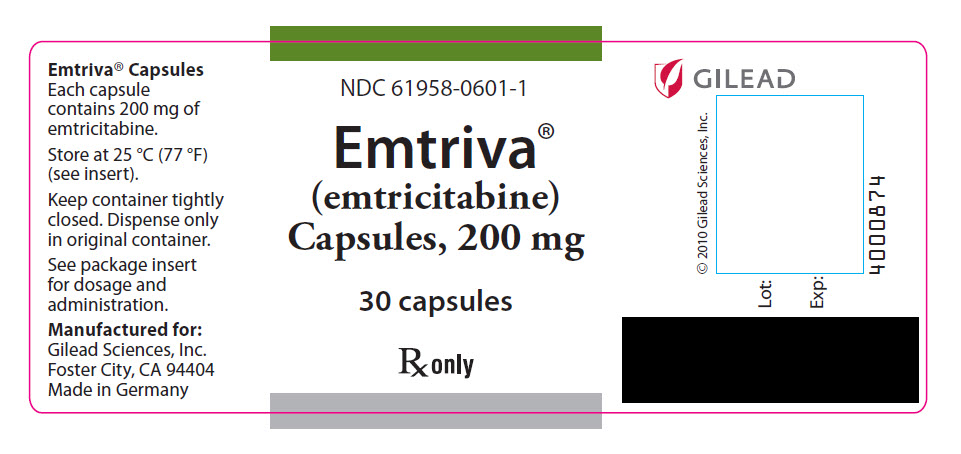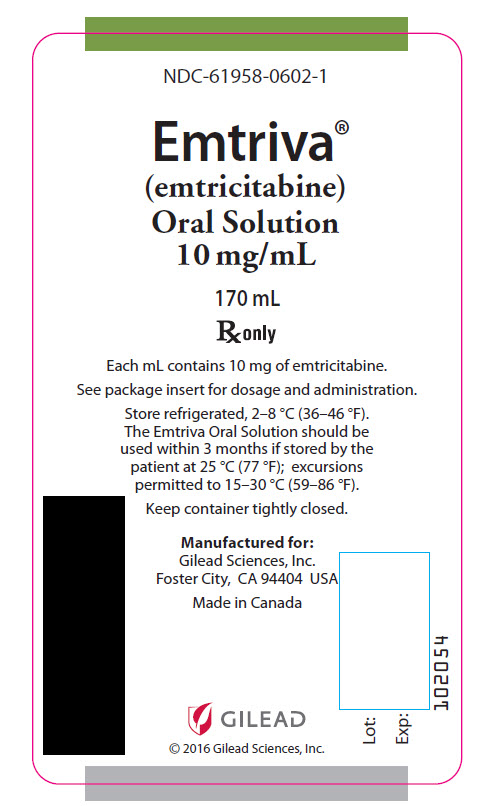Emtriva
Generic name: emtricitabine
Drug class: Nucleoside reverse transcriptase inhibitors (NRTIs)
Medically reviewed by A Ras MD.
What is Emtriva?
Emtriva is a prescription medicine used in combination with other antiretroviral medicines to treat Human Immunodeficiency Virus-1 (HIV-1) infection.
HIV-1 is the virus that causes Acquired Immune Deficiency Syndrome (AIDS).
Description
EMTRIVA is the brand name of emtricitabine (FTC), a synthetic nucleoside analog with activity against human immunodeficiency virus type 1 (HIV-1) reverse transcriptase.
The chemical name of FTC is 5-fluoro-1-(2R,5S)-[2-(hydroxymethyl)-1,3-oxathiolan-5-yl]cytosine. Emtricitabine is the (-) enantiomer of a thio analog of cytidine, which differs from other cytidine analogs in that it has a fluorine in the 5-position.
It has a molecular formula of C8H10FN3O3S and a molecular weight of 247.24. It has the following structural formula:

Emtricitabine is a white to off-white powder with a solubility of approximately 112 mg/mL in water at 25 °C. The partition coefficient (log P) for FTC is −0.43 and the pKa is 2.65.
EMTRIVA is available as capsules or as an oral solution.
EMTRIVA capsules are for oral administration. Each capsule contains 200 mg of FTC and the inactive ingredients crospovidone, magnesium stearate, microcrystalline cellulose, povidone, titanium dioxide, gelatin, and FD&C blue No. 2.
EMTRIVA oral solution is for oral administration. One milliliter (1 mL) of EMTRIVA oral solution contains 10 mg of FTC in an aqueous solution with the following inactive ingredients: cotton candy flavor, FD&C yellow No. 6, edetate disodium, methylparaben and propylparaben (added as preservatives), sodium phosphate (monobasic), propylene glycol, water, and xylitol (added as a sweetener). Sodium hydroxide and hydrochloric acid may be used to adjust pH.
What is the most important information I should know about Emtriva?
Emtriva can cause serious side effects, including:
- Worsening of Hepatitis B virus infection (HBV). Your healthcare provider will test you for HBV before starting treatment with Emtriva. If you have HBV infection and take Emtriva, your HBV may get worse (flare-up) if you stop taking Emtriva. A “flare-up” is when your HBV infection suddenly returns in a worse way than before.
- Do not stop taking Emtriva without first talking to your healthcare provider.
- Do not run out of Emtriva. Refill your prescription or talk to your healthcare provider before your Emtriva is all gone.
- If you stop taking Emtriva, your healthcare provider will need to check your health often and do blood tests regularly for several months to check your HBV infection, or give you a medication to treat hepatitis B. Tell your healthcare provider about any new or unusual symptoms you may have after you stop taking Emtriva.
For more information about side effects, see the section “What are the possible side effects of Emtriva?”
Who should not take Emtriva?
Do not take Emtriva if you are allergic to emtricitabine or any of the ingredients in Emtriva. See the end of this leaflet for a complete list of ingredients in Emtriva.
What should I tell my healthcare provider before taking Emtriva?
Before taking Emtriva, tell your healthcare provider about all of your medical conditions, including if you:
- have liver problems, including HBV infection
- have kidney problems or receive kidney dialysis treatment
- are pregnant or planning to become pregnant. It is not known if Emtriva can harm your unborn baby. Tell your healthcare provider if you become pregnant during treatment with Emtriva.
Pregnancy Registry: There is a pregnancy registry for women who take Emtriva during pregnancy. The purpose of this registry is to collect information about the health of you and your baby. Talk to your healthcare provider about how you can take part in this registry. - are breastfeeding or plan to breastfeed. Emtriva can pass to your baby in your breast milk. Do not breastfeed if you have HIV-1 because of the risk of passing HIV-1 to your baby. Talk with your healthcare provider about the best way to feed your baby.
Tell your healthcare provider about all the medicines you take, including prescription and over-the-counter medicines, vitamins, and herbal supplements.
Some medicines may interact with Emtriva. Keep a list of your medicines and show it to your healthcare provider and pharmacist when you get a new medicine.
You can ask your healthcare provider or pharmacist for a list of medicines that interact with Emtriva. Do not start a new medicine without telling your healthcare provider. Your healthcare provider can tell you if it is safe to take Emtriva with other medicines.
How should I take Emtriva?
- Take Emtriva exactly as your healthcare provider tells you to take it.
- Dosing in adults: Take Emtriva by mouth 1 time each day.
- Dosing in children: Take Emtriva by mouth 1 time each day. The child’s healthcare provider will calculate the right dose of Emtriva (oral solution or capsule) based on the child’s weight.
- Emtriva may be taken with or without food.
- Do not miss a dose of Emtriva. Missing a dose lowers the amount of medicine in your blood. Refill your Emtriva prescription before you run out of medicine.
- Do not change your dose or stop taking Emtriva without first talking with your healthcare provider. Stay under a healthcare provider’s care when taking Emtriva.
- If you take too much Emtriva, call your healthcare provider or go to the nearest hospital emergency room right away.
What are the possible side effects of Emtriva?
Emtriva may cause serious side effects, including:
- See “What is the most important information I should know about Emtriva?”
- Changes in your immune system (Immune Reconstitution Syndrome) can happen when an HIV-infected person starts taking antiretroviral medicines. Your immune system may get stronger and begin to fight infections that have been hidden in your body for a long time. Tell your healthcare provider right away if you start having any new symptoms after starting Emtriva.
- Too much lactic acid in your blood (lactic acidosis). Too much lactic acid is a serious but rare medical emergency that can lead to death. Tell your healthcare provider right away if you develop any of these symptoms:
- Severe liver problems. In rare cases, severe liver problems can happen that can lead to death. Your healthcare provider may tell you to stop taking Emtriva if you develop new or worse liver problems during treatment with Emtriva. Tell your healthcare provider right away if you develop any of these symptoms:
- fatigue
- weakness
- yellowing of your skin or the white part of your eyes (jaundice)
- light colored stools
- nausea and vomiting
- confusion
- dark “tea-colored” urine
- loss of appetite for several days or longer
- stomach-area (abdominal) swelling and pain
The most common side effects of Emtriva include:
- headache
- diarrhea
- nausea
- tiredness
- dizziness
- depression
- problems sleeping
- abnormal dreams
- rash
- abdominal pain
- weakness
- cough
- runny nose
Skin discoloration in children may also happen with Emtriva.
These are not all the possible side effects of Emtriva.
Call your doctor for medical advice about side effects. You may report side effects to FDA at 1-800-FDA-1088
General information about the safe and effective use of Emtriva
Medicines are sometimes prescribed for purposes other than those listed in a Patient Information leaflet. Do not use Emtriva for a condition for which it was not prescribed. Do not give Emtriva to other people, even if they have the same symptoms you have. It may harm them. You can ask your healthcare provider or pharmacist for information about Emtriva that is written for health professionals.
How should I store Emtriva?
- Store Emtriva capsules at room temperature between 68°F to 77°F (20°C to 25°C) .
- Store Emtriva oral solution in the refrigerator between 36°F to 46°F (2°C to 8°C). Do not freeze.
- You may also store Emtriva oral solution at room temperature between 68°F to 77°F (20°C to 25°C) for up to 3 months. Throw away any unused Emtriva oral solution after 3 months.
- Keep Emtriva in its original container and keep the container tightly closed.
- Do not use Emtriva if seal over bottle opening is broken or missing.
Keep Emtriva and all other medicines out of reach of children.
What are the ingredients in Emtriva?
Active Ingredient: emtricitabine
Inactive Ingredients:
Emtriva capsules: crospovidone, magnesium stearate, microcrystalline cellulose, povidone, titanium dioxide, gelatin, and FD&C blue No. 2.
Emtriva oral solution: cotton candy flavor, FD&C yellow No. 6, edetate disodium, methylparaben and propylparaben, sodium phosphate (monobasic), propylene glycol, water, and xylitol. Sodium hydroxide and hydrochloric acid may be used to adjust pH.
Label
PRINCIPAL DISPLAY PANEL – Representative Bottle Label
- NDC 61958-0601-1
- Emtriva ®(emtricitabine) Capsules, 200 mg
- 30 capsules
- Rx only

PRINCIPAL DISPLAY PANEL – 170 mL Bottle Carton
- NDC-61958-0602-1
- Emtriva ®(emtricitabine)
Oral Solution
10 mg/mL
- 170 mL
- Rx only
- Each mL contains10 mg of emtricitabine
- GILEAD

SRC: NLM .
